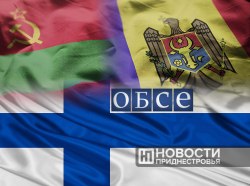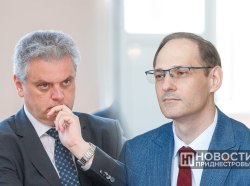Moldova's Institute for Efficient Policy presented last week a plan to integrate Pridnestrovie into Moldova. It was presented during a round table discussion organised by Moldova's «civil society» under the characteristic name «Reintegration of Pridnestrovie: encouragement and enforcement». The report provides a step-by-step guidance to destroy Pridnestrovie.
At first glance, this plan may seem another «scary story» devised by intransigent proponents of restoring a «constitutional order» who are willing to solve the Pridnestrovian problem by force and whose number has not diminished since 1992. The Institute for Efficient Policy is headed by the well-known Russophobe and chauvinist Vitali Andrievschi, a generator of anti-Pridnestrovian hysteria. Besides him, among the authors of the plan are one more radical Russophobe Ruslan Sevcenco and a well-known Moldovan politician Oazu Nantoi, who consistently promotes radical concepts of «suppressing» Pridnestrovie.
But with more careful analysis, it becomes evident that today the Moldovan authorities are nearly exactly following the plan submitted by «civil society».
«Red lines» sect
Throughout the past year, Moldovan officials said they were drafting a certain «vision» for the settlement of the Moldo-Pridnestrovian conflict. The plan was to go public in 2017, and as a rule, Kishinev invited this very «civil society» — various NGOs and experts financed with Western grants — to work on such documents.
It may be recalled that last year this «civil society» spoke up against the Berlin Protocol signed by Moldova, calling on the authorities to ignore, as otherwise it would be tantamount to making concessions to Pridnestrovie. Moreover, they demanded that Moldovan officials not engage in any substantive dialogue with the PMR. The Moldovan vice premier, Ghorghe Balan, who was signing the Berlin Protocol as if it was a capitulation act, used such statements as a pretext to wash his hands — for nearly six months he ceased engaging in dialogue with Pridnestrovie, which led the negotiating process to a stalemate.
Yet another point — many provisions of the report are being already implemented by the Moldovan government and even backed by the «allegedly pro-Russian» President Igor Dodon. In particular, this refers to cooperation with Ukraine in stifling Pridnestrovie. As we can see, the joint Moldo-Ukrainian control over the Pridnestrovian border is already under way.
But first things first.
The authors of the report call Pridnestrovie a «criminal enclave» and Pridnestrovians criminals with characteristic «fear, conformity, hypocrisy». They further say that the inhabitants of Pridnestrovie «must pass through the process of 'de-Pridnestrovisation'," like Germany's denazification, which requires the enactment of a lustration law. Pridnestrovians are invited to fill out a loyalty questionnaire, which actually proposes to pledge allegiance to Moldova.
The report's e-version, by the way, which is available on the institute's website, has no „de-Pridnestrovisation“ paragraph. However, Novosti Pridnestrovya has a full, non-redacted version of the report.
In the meantime, the authors avoid like the plague mentioning any status of Pridnestrovie within Moldova and say that „Pridnestrovie's integration into Moldova as it stands directly threatens to 'Pridnestrofy' the whole of Moldova.“ It is also noted that in this case Russia would be given many opportunities to influence Kishinev.
The Moldovan „civil society“ therefore considers that Moldova's primary task is to either break the position of the Pridnestrovian administration or withdraw it from the negotiating process» and gradually but quickly stifle Pridnestrovie.
It should be noted that today Moldova and Pridnestrovie, with the support of the EU, are trying to drive the PMR out of the negotiating process by creating new blockade regimes behind Pridnestrovie's back. Meanwhile, Pridnestrovie's calls to resume negotiations and discuss the issue of customs posts in the international «5+2» format are being ignored.
Selectionists
The plan's authors believe that the status of Pridnestrovie as a party to negotiations «should be changed to the status of a criminal structure», demanding its full and unconditional capitulation.
Let's recall once again that last year Moldovan «experts» called for no dialogue with any Pridnestrovian officials as «they are actually working to destroy the Moldovan state.» Besides, as we remember, dozens of criminal cases have already been brought in Moldova against Pridnestrovian officials for «illegitimate appropriation of power».
According to the Andrievschi-Nantoi plan, Moldova can even partially recognise Pridnestrovians' property rights to private housing, but with a reservation: no more than one flat. And the owners of Pridnestrovian enterprises are proposed to legalise their ownership, but on the condition of «compensating for material damage suffered by Moldova due to illegal privatisation»! In addition, the authors are even ready to pardon the defenders of Pridnestrovie, but only if they did not fulfil command duties.
In general, a bunch of Moldovan intellectuals condemn Pridnestrovian residents to «dechauvinisation», «de-empirasation», «decriminalisation» and «decommunisation». It is strange there is no project to create concentration camps, although the plan's nature and style a priori imply selective mechanisms for Pridnestrovians.
It is indicative that the authors clearly point to Moldova's need to compel Russia to abandon its support of the PMR or at worst «minimise Russian activities in this direction». To do so, they should surrender Pridnestrovie on all sides and, with the US's support, drive Russia out of here. «Experts» even suggest abandoning the country's neutral status and engaging in discussions on a project for a «regional defence alliance of Poland, Ukraine, Moldova and Romania as part of the future Baltic-Black Sea arc», which is naturally aimed against Russia. In this context, it is no coincidence that the Moldovan authorities conduct regular NATO exercises in the country, including in the Security Zone.
Opportune moment
The authors of the plan are convinced that the current political situation is now conducive to its implementation and describes four factors that «work in favour of Moldova».
Firstly, they feel the political will has emerged in Moldova at the level of the highest-ranking authorities to fulfil such a plan. Expressing solidarity, «civil society» applauds the Constitutional Court of Moldova which has declared the Russian peacekeepers to be occupants.
Secondly, Ukraine is ready today «to really assist Moldova in its struggle against separatism», as evidenced by the introduction of joint control over the Pridnestrovian sector of the Moldo-Ukrainian border.
Thirdly, «the US-Russia and EU-Russia relations have become very tense, with Moscow not ready for further escalation.» Therefore, «Moldova must not squander an opportune moment and propose its plan of action which would be of current interest to Washington and Brussels».
And fourthly, «civil society» sees «good relations between the presidents of Moldova and Russia» as one of the opportune moments for Moldova.
***
This plan does not only mean to force Pridnestrovie into Moldova, but also to clean it up. Now it is only available on the official website of the Institute for Efficient Policy, but there is no doubt it will necessarily be put on the table of the Moldovan leadership. Its authors — Andrievschi, Nantoi, Sevcenco and others — have been for many years the systemic analysts of the Moldovan government and have been involved in drafting various concepts of this kind. And although the Moldovan authorities are already implementing some provisions of the plan, another thing is important — if this document were indeed a practical «guide for action», it would not have been published. Its true purpose is to show Pridnestrovians what attitudes prevail in the Moldovan expert community, to sow panic and to suggest that Kishinev wants to treat Pridnestrovie «in a bad way». In reality, however, the desire to turn Pridnestrovie into a «concentration camp» is only sick fantasies of a group of radicals.
Nikolay Syrbu.








